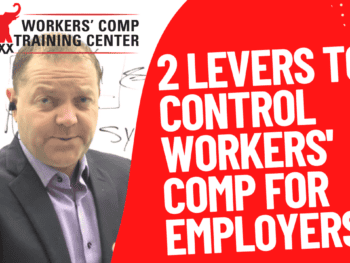If an employer receives a report of a work injury or illness, does it “help” or “hurt” the employer to pay the worker wages after the report? In the past, many employers would halt all contact with the worker after a claim was reported. Others would voluntarily pay all or some wages and claim a reimbursement from later comp awards.
Wage Payments Can Be Made Without Admitting Liability
But there was a problem. In order to claim the reimbursement the employer had to acknowledge that it was making the payments for a work related injury or illness. Several years ago, however, the comp law was amended to permit the employer to make payments without conceding liability for a comp claim., provided that the employer filed a timely notice with the WCB (form C-669) 18 days after disability commenced or 10 days after the employer had knowledge of the injury, whichever is later.
The employer can make payments for up to one year; if they continue after that, it will be taken as an admission that there is a valid comp claim. Whenever the employer stops payment, it must file form C-8/8.6.
The changes have received little attention. But before the changes, there were frequently lengthy disputes over whether or not the payments were for comp (in which case the employer could be reimbursed) or for some other reason (in which case the employer might not be reimbursed).
Changes In Law Require Proper Paperwork Be Filed
An employer would be wise to be familiar with the changes (contained in NY Work Comp Law, Sect. 21-a).
If an employer wishes to make payments to an injured worker WITHOUT admitting liability for a comp claim, it MUST file form C-669 with the board, and form C-8/8.6 when it stops. Copies must be sent to the worker and the attorney.
Many more employers would make such payments if they were assured that it does not “hurt” a comp claim. In the past, far too many attorneys would argue that such payments should always be taken as an admission of liability, even though few employers ever saw a single medical report which would indicate, one way or the other, if the injury was work related.
Employers Making Wage Payments Helps More Than It Hurts
Employers should be willing to make such payments, within reason, since they greatly reduce the size and length of a comp claim. Without the wage loss payments by an employer, the worker must wait, at least, a few weeks to get the first check from a carrier; and the checks are often a small fraction of the former take home pay. But delays of months, or even years before the first check arrives from a carrier are not exactly rare. They are, in fact, common. If an employer thinks that only the carrier will be blamed, it is very much mistaken.
Prompt attention to a situation fraught with problems – such as NY work comp claims – will make it possible to settle dangerous claims for a fraction of what the result will be if the claim gets off to a bad start. Many workers who never have encountered the comp system make assumptions of what will happen, when they are hit with the ice water of reality they seek lawyers.
Employers are not normally required to make wage loss payments – but it helps more than it hurts.
Author: Attorney Theodore Ronca is a practicing lawyer from Aquebogue, NY. He is a frequent writer and speaker, and has represented employers in the areas of workers’ compensation, Social Security disability, employee disability plans and subrogation for over 30 years. Attorney Ronca can be reached at 631-722-2100. medsearch7@optonline.net
Editor Michael B. Stack, CPA, Director of Operations, Amaxx Risk Solutions, Inc. is an expert in employer communication systems and part of the Amaxx team helping companies reduce their workers compensation costs by 20% to 50%. He is a writer, speaker, and website publisher. www.reduceyourworkerscomp.com. Contact: mstack@reduceyourworkerscomp.com.
©2013 Amaxx Risk Solutions, Inc. All rights reserved under International Copyright Law.



























